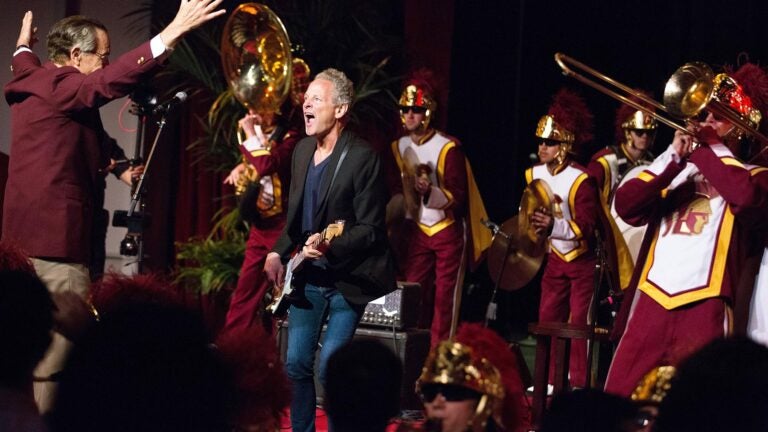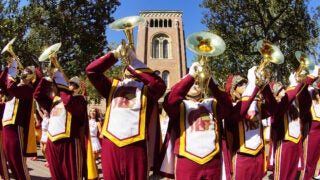
Lindsey Buckingham performs with the USC Trojan Marching Band on April 29 at Bovard. (USC Photo/William Vasta)
Lindsey Buckingham makes for a memorable last class in entrepreneurship
Fleetwood Mac guitarist talks with (and sings for) students at Bovard, and the Trojan Marching Band stops by. ‘Tusk,’ anyone?
In what was arguably one of the most memorable final class sessions ever, Lindsey Buckingham and the USC Trojan Marching Band reenacted the iconic “Tusk” from the 1979 Fleetwood Mac album of the same name before a capacity crowd of students, alumni, faculty, staff and friends at Bovard Auditorium.
The April 29 event was the final meeting of David Belasco’s BAEP 470 class, “Taking the Leap,” which focuses on the entrepreneurial mindset and has featured guests including Jessica Alba, Tom Barrack, Mark Cuban and Laird Hamilton.
Belasco, co-director of the USC Lloyd Greif Center for Entrepreneurial Studies, had long hinted about his special guest, and with an amplifier sitting onstage, it was clear this would be no ordinary lecture.
“We use the term ‘rock star’ a lot today to describe somebody who has done something great,” he said. “But tonight, we have an actual rock star.”
Part talk, part concert
The evening was equal parts artistic discourse and concert, with Buckingham treating the audience to acoustic performances of classic Fleetwood Mac songs such as “Never Going Back Again,” “Bleed to Love Her” and “Big Love.”
Buckingham, who grew up in Atherton, Calif., taught himself guitar after his older brothers started listening to Elvis Presley and other early rockers.
He met singer/songwriter Stevie Nicks in high school, but didn’t collaborate with her until later when he’d started a band. It was her idea to go to Los Angeles and try for a record deal.
The duo Buckingham Nicks had modest success, but had been dropped by their label when in 1975 English drummer Mick Fleetwood asked them to join his band, Fleetwood Mac.
Joining an established band had its challenges, Buckingham said: He had to pare down his orchestral style of guitar to fit into the group, “but that’s just one of the compromises you have to make if you call yourself a band member.”
The band’s 1977 album Rumours hit the top of the charts and stayed there for 31 weeks, selling some 40 million copies and becoming the sixth best-selling album of all time.
Buckingham said it was the raw pain of breakups — he and Nicks were splitting up after six years, and Christine McVie and the band’s bassist, John McVie, had also separated — that fueled the music and lyrics so many related to.
“It was laid bare for all to see,” he said. “The songs were true dialogues from three different writers. People felt that.”
Art and suffering
Belasco asked if great art takes great suffering. Buckingham said perhaps, but not to the extent people think.
“At the very least, suffering will broaden your emotional landscape,” he said. “But I don’t think you need to suffer to make effective art.”
There was definite artistic fallout from the success of Rumours, Buckingham said. “At some point it stopped being about the art and started being about the success,” he said.
From a business standpoint they were expected to replicate the success of that album.
“Rumours was a moment in time,” he said. “What happens with art is you slowly start painting yourself into a corner, and that’s antithetical to being an artist.”
The band’s next album, Tusk, was in large part an artistic backlash against superstardom, he said.
That album’s title song, of course, is the track that featured the USC Trojan Marching Band. It was Fleetwood’s idea, he said, to mesh a marching band sound with a driving drum beat: “It was a sublime marriage of two completely different worlds.”
The double-album, while critically panned, sold 4 million copies worldwide.
Tusk is my favorite album because it set me on the path to be an artist, and not just a craftsman doing music.
Lindsey Buckingham
“Tusk is my favorite album because it set me on the path to be an artist, and not just a craftsman doing music,” said Buckingham.
The evening ended with Buckingham and the Trojan Marching Band performing “Tusk” and “Go Your Own Way” to a cheering crowd. Arthur C. Bartner, who has directed the band for more than four decades and was present at the 1979 taping of the “Tusk” video at Dodger Stadium, conducted from the stage. Earlier in the evening, the Lloyd Greif Center for Entrepreneurial Studies honored Ben Van de Bunt, a member of the center’s advisory board, with the Lead Blocker Award for his role in bringing speakers to USC.
In addition to Buckingham, he helped bring Cindy Crawford, Tony Robbins and Gary Vaynerchuk to speak at the Center. Presenting the award were USC Athletic Director Pat Haden ’75 and J.K. McKay ’75, senior associate athletic director. At the end of the program, Helena Yli-Renko, co-director of the Lloyd Greif Center, holder of the Orfalea Director’s Chair in Entrepreneurship and associate professor of clinical entrepreneurship, awarded Buckingham with the Musical Entrepreneur of the Year award.



